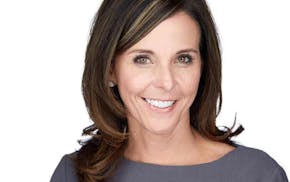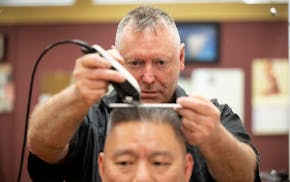Latvian-born John Freivalds, Minnesota marketer and honorary consulate to Latvia, urges one way to support Russian-besieged Ukraine: buy "Stoli" vodka.
Stolichnaya vodka was created around 1940 in the Soviet Union, and produced by a state-run company. With the collapse of the Soviet Union, it became a private company, and after a dispute with the Russian government over trademark rights, major shareholder Yuri Shefler sold it to one of his other entities and moved production to Latvia.
Over the years, Stolichnaya was shortened to Stoli, and the company made it official in March, announcing a major rebranding while also condemning Vladimir Putin's invasion of Ukraine and other human rights abuses.
Fast-growing Stoli Group, whose global CEO is now Damian McKinney, a former officer in the British Royal Marines, has donated millions from sale of a commemorative blue and yellow bottled Stoli that benefits Ukrainian humanitarian relief.
McKinney may visit Minnesota for a seminar planned by Carlisle Ford Runge, University of Minnesota professor of international economics and law. Runge wrote recently in Foreign Affairs that America and allies could trump the Russian blockade of Ukrainian wheat exports through expansion of the 2022 Ukraine Democracy Defense Lend-Lease Act through the World Food Program and the U.S. Commodity Credit Corp.
Freivalds, an energetic 78-year-old, predicted years ago in a book that Russia would eventually attack Ukraine and use food as a weapon.
He led a career that ranged from commodity trading to representing a Russian tie maker in the short period of the Mikhail Gorbachev presidency. However, state assets were divvied up among oligarchs by Gorbachev successors Boris Yeltsin and Putin. Crony capitalism triumphed.
And Putin has proven an enemy of internal dissent, free press and democratic states. That includes neighboring Baltic states of Lithuania, Estonia and Latvia.
The people of these tiny countries, free of Russian occupation for more than three decades thanks to the breakup of the former Soviet Union, worry they may be the next Putin takeover targets. They also belong to NATO, the globe's most-powerful military alliance of democracies. And they are members of the European Union, an integrated economy of almost 450 million people.
Freivalds and Dean Ramos, president of the Latvian American Chamber of Commerce's Minnesota region, last week welcomed Latvian Prime Minister Kirsjanis Karins to meetings with business and state officials in St. Paul.
Ramos, an investment executive, noted the Baltic states in 2021 had per-capita economic output of $34,067, compared with $13,908 for the 12 remaining Russian republics. Russia has an economy built on oil, gas and mining — extraction. Latvia's increasingly is based on value-added foods, electronics, manufacturing and forest industries.
"Latvia is a safe place [for investment]," Karins asserted, noting that is protected by its own and other NATO troops, including swelling ranks of Americans forces in Europe. And little Latvia is a proportionately huge donor to Ukrainian relief.
"Latvians demonstrate ingenuity by necessity," Karins said. "It's second nature to us. We are agile and nimble. The same cultural gene that makes us singers."
Indeed, thousands of Latvians and Latvian Americans gathered in St. Paul last week for the 15th Latvian Song and Dance Festival USA.
"Latvia looks to us and their diaspora for opportunity," said Ramos, 58, the son of Latvian and Mexican immigrants from North Dakota. "They can't do big China-type deals by dropping in on Washington, D.C. They go state by state. Latvia is small and aggressive.''
There are discussions among Latvian and Minnesota business and trade officials to further commercial ties in microelectronics, renewable energy and more.
Latvia, with only 2 million citizens, ranked as Minnesota's 63rd largest trading partner in 2021, at $8.9 million. Latvia's No. 1 export? Vodka at $3.5 million. Minnesota shipped $4.4 million worth of machinery, electrical equipment and cereal to Latvia.
Freivalds is an optimist who arrived penniless with his parents in the United States in the early 1950s aboard the USS Mercy. Freivalds, whose father ran the Latvian section of the Voice of America, is a graduate of Georgetown University and proud veteran of the Peace Corps.
He moved his family to Minnesota nearly 50 years ago to market low-cost Minnesota farm byproducts, such as beet pulp pellets, a high-protein low-fat animal feed. Freivalds is an energetic promoter of Minnesota, Latvia, Ukraine and human rights.
"If there is one ironic benefit to making Latvia better known, it has been the war in Ukraine," Freivalds said. "It has brought attention to NATO, fear that the Baltics would be next and that we should never take freedom for granted.
"At least now when I tell people I am Latvian, they don't say 'what's that?' ''

St. Anthony: 'Patient' investing paying off for St. Paul's Hill Capital

Jennifer Smith, leader of Burnsville's Innovative Office Solutions, has died

St. Anthony: Medical professions in Minnesota need more people of color in their ranks


